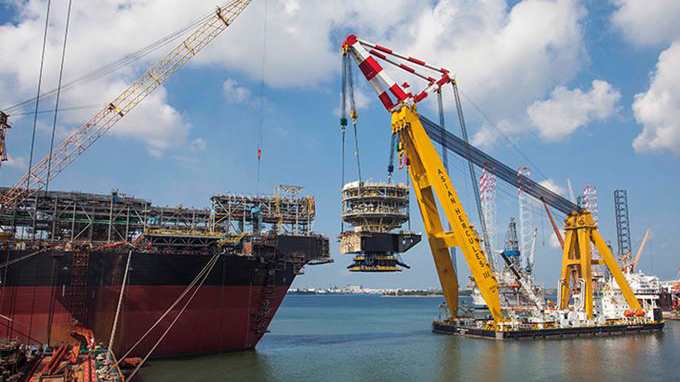Ghana’s trade bill reflects an uptick in oil imports by close to 50 per cent (48.83%) compared to oil exports which ticked up by 35.63% in 2021, reflecting increased local demand of the commodity over the period, according to data from the Bank of Ghana (BoG).
The increase in growth of oil and gas imports dragged total imports along, registering an increase of 9.7 percent year-on-year to US$13.6 billion compared with US$12.4 billion in the previous year.
“Of this, refined petroleum products increased by almost US$1 billion over the year reflecting the rebounding economy from the pandemic restrictions in 2020”.
BoG
Within the 12-month period, Ghana imported petroleum products worth US$2.72 billion compared with US$1.90 billion worth of oil imports in the previous year. The value of petroleum exports also rose to US$3.95 billion from US$2.91 billion in the prior year.
Compared to the previous year, this mirrors the rebound in economic activities after the Covid-19 pandemic-induced restrictions reduced mobility and productive activities within sectors that use oil products: downstream petroleum sector, other oil and gas dependent manufacturing firms, transport services and maritime trade.
Partly, the country’s low crude output during the period presented a dilemma, thus driving oil imports in an upward trajectory. Within the first nine months of the year, total crude output produced in the country’s three oil fields was around 152,000b/d.
Also, contributing to the rise in imports of petroleum products is partly as a result of the underperformance of the Tema Oil Refinery (TOR), the nation’s sole oil refinery which has not been able to meet its full capacity utilization.
According to the Ghana Energy Commission, Ghana’s petroleum production requirement far exceed the capacity of TOR with the shortfall estimated in the range of 26-30 per cent under the assumption that TOR is operating at over 90 per cent capacity utilization.
Demand for Refined Petroleum Products Rising
Fitch Solutions forecasts Ghana will register positive growth of 3.0 per cent in its refined fuels consumption over 2022, to reach 96,800b/d, owing to upbeat GDP growth prospects and a recovery in private consumption.
“With the rise in consumption fueling growing demand for imports of petroleum products- which has implications on the country’s currency- this may come at a huge cost to the country”.
Fitch
The country’s refined fuel consumption is likely to increase to 2.3 percent year-on-year growth in demand over the long-term, to reach 112,330b/d by 2030.
However, import statistics on petroleum products showed a decline in 2019 with petroleum products registering 71.9 per cent of total amount of energy imported into the country whilst in 2018, it constituted 84.2 per cent of total energy products imported.
Despite the decline, this reflects a huge proportion of imports of petroleum products. This indicates that the country depends heavily on imported petroleum products to meet its energy demand.
Furthermore, Ghana’s crude oil exports began this year on a strong footing owing to the appreciable rise of crude oil prices on the international market averaging US$65/barrel within the first five months of the year, and rising to as high as US$85 in November 2021.
However, the country’s crude oil production capacity continues to remain subdued as well as its refining capacity. These major challenges have to be addressed to slow down the rise in oil imports and build a more robust and resilient petroleum sector.
READ ALSO: Ghana’s Trade Surplus Declined By US$0.9 Billion In 2021





















